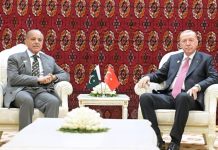DM Monitoring
But worry not, the next time you go, you could ask your local fixers to find a funeral and join in with prayers for the soul of the departed.
To see ordinary Kashmiris, of all shapes, sizes, and ages, you need not even visit Kashmir. Many are scattered across north Indian prisons – most have not been charged, and do not have robust legal aid – providing a real chance to talk to people in their natural habitat.
You must then visit the only psychiatric hospital in Srinagar. Here you can find your average distressed native anywhere you look, as the incidence of deep trauma among us has risen because of the long siege of our earthly paradise. Previously, only one in two Kashmiris suffered from some form of post-traumatic stress disorder; now, you will have to politely ask your hosts, who imposed the siege six months ago, about the curve of that statistic.
The envoys might deserve some credit for their assiduous devotion to the great Indian democracy roadshow. It’s not the first time that European diplomatics in India have made themselves useful on the Kashmir front. In 2013, the then German ambassador, Michael Steiner, put on a concert for the conductor Zubin Mehta in a picturesque garden on the shores of Dal Lake. We were told it was to bring peace and harmony to the people of Kashmir. Attended mainly by spooks, bureaucrats, officials, politicians and a few fawning journalists, the concert ended up resembling a dark skit straight out of a war comedy: hours before the concert a motorist was shot and wounded for failing to obey orders to stop. Meanwhile in south Kashmir, four Kashmiris were killed by Indian paramilitaries, as the invitation-only guests listened to rhapsodic orchestral music in a walled garden surrounded by soldiers with semi-automatic weapons.
Tourist envoys have occasionally visited Kashmir to examine, ascertain and report on we are told, what Kashmiris really want, despite Kashmiris having for years written in blood that they want azadi, to self-determine their destiny.
As one is unable to compute how boatloads of foreign and Indian delegates are going to help, one is compelled to conclude that it may just be a good old freebie, a fully paid trip to one of the most beautiful places on the planet.
Advertisement
It doesn’t matter that Kashmiris have been subject to conquistadorial silencing, to surveillance that brings to mind the Stasi, to torture and mass incarceration, suppression of assembly, a draconian internet shutdown, the crushing of their free press, the devastation of their economy, the crippling of the education system, the criminalisation of speech (those who’ve been set free have literally had to sign “bonds of silence”) and the gagging of their civil society.
It doesn’t matter that the natives are being punished en masse. You can always keep them out of the frame, as a young Afghan counsel to India gleefully did during the latest PR expedition, when he told reporters: “Everything is normal and alright here. We saw children on the way to their school, which is a sign of normalcy.”
This is a curious statement: schools and colleges in Kashmir are firmly shut during the long and harsh winters. It doesn’t matter that everyone in Kashmir knows this is a state-crafted sojourn. It clearly didn’t matter that the young Afghan diplomat ended up saying precisely what his hosts in Delhi wanted to be said. Because that was both the job description and the objective.–Concluded



